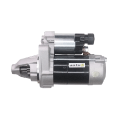Verified Reviews - Mobile Mechanic Near Me

Brenda Hornbeck
Verified
I needed a pre-purchase inspection for a used car I was considering. The mobile mechanic provided a thorough evaluation, giving me peace of mind before making the purchase. Their detailed report was invaluable.
Naseem Alam
Verified
Super fast repair and excellent customer service. They had my car back to me the same day, and it’s running perfectly. The prices were reasonable, and the staff made sure I was informed every step of the way.
Anonymous
Verified
Convenient, responsive, and fair service. Hadn't used a mobile mechanic before, but getting a tow truck into my apartment building's parking garage seemed infeasible, so I gave it a try. Glad I did. Bit of a language barrier with the particular mechanic I got, but he was very friendly and patient, so we worked through it without issue.
Stephen McDaniel
Verified
Amazing service. I work on my own car but had a cv axel stuck and was done trying to pry it out. I called them and paid ahead of time for service to be done the next day. The mechanic calls and shows up an hour later, which was even better. You can tell he had a lot of experience and tools because he got the axel out in 30 minutes, while it took me 6 hours and a lot of cuss words and got no where. Pricing was average if not cheaper . I feel like VA car and tire would have charged me double and I would have had to drop it off. Great experience, I will use them again if needed.
Alexis Copeland
Verified
I was kinda of nervous initially with a mobile mechanic, however all my worries became non existent. The entire process is seamless , from the service reps who follow up with you after scheduling online to mechanic arriving to your location. The fact that any work can be done from your home is a plus . My truck was stalling while idling , I replaced the part that was causing the issue , I explained to the mechanic once he arrived that I recently replaced the throttle body . During the diagnosis he programmed the throttle to my truck and waited awhile ,after to ensure that was the fix to the issue. Once that was we resolved I was advised that I may need a few minor fixes in the future but overall I was good to go . I highly recommend Instant car fix and will most definitely reach out to them for any future issues. The entire process went smoother than any experience that I’ve ever had with any mechanic shop!!! A1 service .

Brenda Hornbeck
Verified
I needed a pre-purchase inspection for a used car I was considering. The mobile mechanic provided a thorough evaluation, giving me peace of mind before making the purchase. Their detailed report was invaluable.
Naseem Alam
Verified
Super fast repair and excellent customer service. They had my car back to me the same day, and it’s running perfectly. The prices were reasonable, and the staff made sure I was informed every step of the way.
Anonymous
Verified
Convenient, responsive, and fair service. Hadn't used a mobile mechanic before, but getting a tow truck into my apartment building's parking garage seemed infeasible, so I gave it a try. Glad I did. Bit of a language barrier with the particular mechanic I got, but he was very friendly and patient, so we worked through it without issue.
Stephen McDaniel
Verified
Amazing service. I work on my own car but had a cv axel stuck and was done trying to pry it out. I called them and paid ahead of time for service to be done the next day. The mechanic calls and shows up an hour later, which was even better. You can tell he had a lot of experience and tools because he got the axel out in 30 minutes, while it took me 6 hours and a lot of cuss words and got no where. Pricing was average if not cheaper . I feel like VA car and tire would have charged me double and I would have had to drop it off. Great experience, I will use them again if needed.
Alexis Copeland
Verified
I was kinda of nervous initially with a mobile mechanic, however all my worries became non existent. The entire process is seamless , from the service reps who follow up with you after scheduling online to mechanic arriving to your location. The fact that any work can be done from your home is a plus . My truck was stalling while idling , I replaced the part that was causing the issue , I explained to the mechanic once he arrived that I recently replaced the throttle body . During the diagnosis he programmed the throttle to my truck and waited awhile ,after to ensure that was the fix to the issue. Once that was we resolved I was advised that I may need a few minor fixes in the future but overall I was good to go . I highly recommend Instant car fix and will most definitely reach out to them for any future issues. The entire process went smoother than any experience that I’ve ever had with any mechanic shop!!! A1 service .

Brenda Hornbeck
Verified
I needed a pre-purchase inspection for a used car I was considering. The mobile mechanic provided a thorough evaluation, giving me peace of mind before making the purchase. Their detailed report was invaluable.































